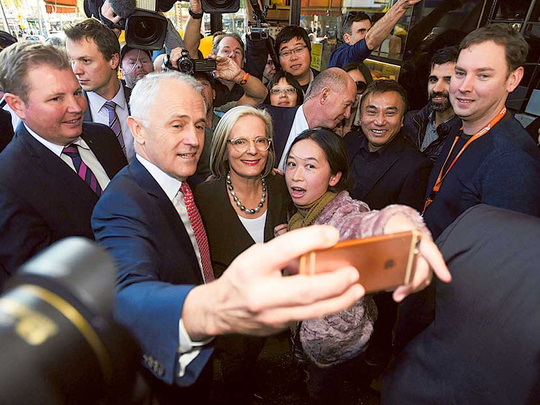
Canberra, Australia: Australians go to the polls on Saturday with the opposition leader vying to become the country’s fifth prime minister in three years. Global market turmoil since the Brexit vote, Australia’s success in turning back asylum-seeker boats, gay marriage, housing prices, corporate tax rates and union corruption have been major issues in the eight-week campaign.
Prime Minister Malcolm Turnbull has urged Australians to vote for continuity and stability by re-electing his conservative coalition, which dumped the country’s last prime minister less than a year ago.
Opposition leader Bill Shorten, who played a key role in his centre-left Labour Party ousting two of its own prime ministers in the space of three years, says the government remains deeply divided and that Labour is the stable option.
“Mr Turnbull says this is the time for stability. You cannot have stability without unity,” Shorten said this week.
New polls on Friday showed voters may return an even more unruly upper house.
Turnbull argued on Friday that minor parties, possibly in coalition with centre-left Labour, could not be trusted to manage an economy hampered by the first mining downturn in a century and balance public finances after years of deficits.
Turnbull, acknowledging that the contest was “really close”, urged voters not to be cavalier.
“This is not a time to make a protest vote. This is a time to treat your vote as though that is the single vote that will determine the next government,” he told reporters in Sydney.
Turnbull’s coalition is facing a strong challenge from Labour, as well as from independents and minor parties like the Greens, who could win enough seats to hold the balance of power in the Senate or force a minority government in the lower house.
A Fairfax/Ipsos poll published on Friday showed Labour and the coalition locked in a dead heat at 50-50, well within the 2.6 per cent margin of error for the survey of 1,377 respondents taken between June 26-29.
The Murdoch-owned Galaxy polling agency showed a similar outcome, with the government faring slightly better on 51-49 on a first party-preferred basis after the distribution of preference votes from minor parties to the two main contenders.
Turnbull’s own grip on power even appeared tenuous, with the Fairfax poll showing 27 per cent of voters intended to vote for a party other than the coalition or Labour.
Independent Senator Nick Xenophon, whose new party is fielding almost 50 candidates, could also emerge with influence.
So, too, could far-right parties, including Pauline Hanson’s One Nation, who have campaigned on anti-immigration and anti-Muslim agendas. “Whatever happens in this election ... if we see One Nation elected, if we see a greater informal vote, blame Malcolm Turnbull and the Greens. This was their idea,” Labour leader Shorten told reporters in Sydney.
Turnbull’s repeated attacks on minor parties could have inadvertently driven voters into their arms by elevating their status on the national stage, said Professor Andrew Hughes from the Australian National University.
Candidates like Xenophon are viewed as trustworthy and are increasingly seen as a brake on pushing through radical reforms such as the coalition’s centrepiece A$50 billion (Dh137 billion) corporate tax break or Labour’s strong push to legalise gay marriage.
“In the lower house, this may very well be the last situation we see a political party in Australia govern in their own right,” Hughes said.












